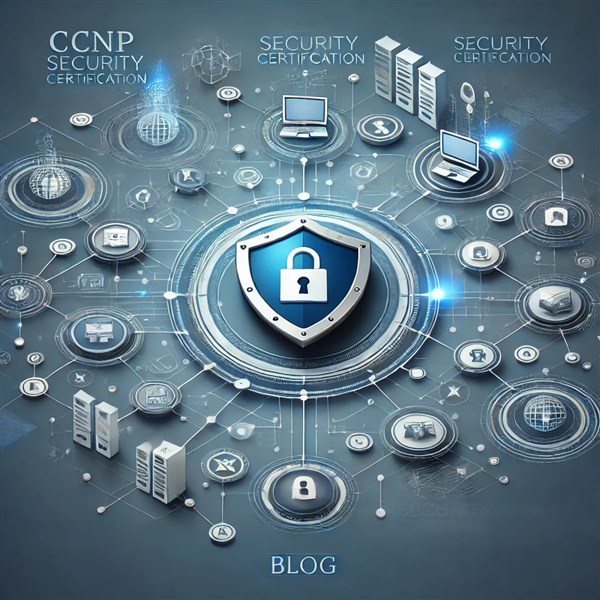
In today’s digital landscape, where cybersecurity threats are becoming increasingly sophisticated, the demand for skilled security professionals has never been higher. One way to establish yourself as a competent candidate in the cybersecurity field is by earning the Cisco Certified Network Professional (CCNP) Security certification. This certification validates your skills in implementing security solutions and prepares you to protect and secure networks effectively. In this blog, we will explore the top skills you’ll gain through the CCNP Security certification, its relevance in the job market, and how it can advance your career in the ever-evolving field of cybersecurity.
Understanding CCNP Security Certification
The CCNP Security certification is a professional-level credential offered by Cisco, aimed at networking professionals who want to demonstrate their expertise in implementing and managing security solutions. This certification is part of the Cisco Career Certification program, which includes a series of exams focusing on different aspects of networking and security.
To earn the CCNP Security certification, candidates must pass a core exam and a concentration exam of their choice. The core exam covers foundational security knowledge and skills, while the concentration exam allows professionals to specialize in a specific area, such as firewalls, VPNs, or identity management.
Key Skills Acquired Through CCNP Security Certification
1. Network Security Implementation
One of the primary skills you will gain from the CCNP Security certification is the ability to implement robust network security measures. This includes configuring and managing firewalls, intrusion prevention systems (IPS), and secure access technologies. You will learn how to:
- Deploy and manage next-generation firewalls to monitor and filter traffic.
- Implement IPS to detect and prevent potential threats in real-time.
- Establish secure remote access solutions using Virtual Private Networks (VPNs).
Understanding these concepts is crucial for maintaining the integrity and confidentiality of organizational data and networks.
2. Advanced Threat Detection and Response
As cyber threats evolve, it’s essential to have advanced skills in threat detection and response. The CCNP Security certification teaches you how to leverage security technologies and tools to identify and respond to threats effectively. Key areas of focus include:
- Utilizing security information and event management (SIEM) tools for threat analysis.
- Implementing endpoint security measures to protect devices from malware and other attacks.
- Conducting security assessments to identify vulnerabilities within the network.
These skills enable you to respond to incidents swiftly and mitigate potential damage to the organization.
3. Identity and Access Management
Identity and access management (IAM) is a critical component of network security. The CCNP Security certification covers how to manage user identities and control access to sensitive resources. Skills acquired in this area include:
- Configuring and managing identity services and authentication protocols, such as RADIUS and TACACS+.
- Implementing role-based access control (RBAC) to ensure users have appropriate permissions.
- Utilizing single sign-on (SSO) solutions for streamlined user access across applications.
By mastering IAM concepts, you help organizations reduce security risks related to unauthorized access and ensure compliance with regulations.
4. Secure Infrastructure Design
A significant aspect of cybersecurity is designing secure network infrastructures. With CCNP Security certification, you will learn how to design secure architectures that protect organizational assets. Skills in this area include:
- Developing secure network designs that incorporate segmentation and zoning principles.
- Planning for redundancy and failover solutions to ensure availability during attacks.
- Implementing security best practices in cloud environments and data centers.
These skills allow you to create a security-conscious framework that enhances overall network resilience.
5. VPN and Remote Access Technologies
In a world where remote work is becoming the norm, understanding VPN and remote access technologies is essential. CCNP Security certification equips you with the skills needed to implement and manage secure remote access solutions. This includes:
- Configuring site-to-site and remote access VPNs using protocols like IPsec and SSL.
- Ensuring secure connectivity for remote users and branch offices.
- Troubleshooting VPN connectivity issues and performance problems.
Mastering these skills allows organizations to provide secure access to employees, regardless of their location.
6. Cloud Security Fundamentals
As organizations increasingly migrate to the cloud, cloud security has become a priority. The CCNP Security certification introduces you to cloud security concepts and best practices. Key areas of focus include:
- Understanding cloud service models (IaaS, PaaS, SaaS) and associated security considerations.
- Implementing security measures for cloud deployments and managing risks.
- Leveraging security tools to monitor and protect cloud resources.
These skills are crucial for safeguarding data and applications in cloud environments and ensuring compliance with industry standards.
7. Regulatory Compliance and Risk Management
Understanding regulatory compliance and risk management is vital for cybersecurity professionals. The CCNP Security certification teaches you how to navigate various regulations and manage risks effectively. Skills acquired in this area include:
- Familiarity with compliance frameworks such as GDPR, HIPAA, and PCI-DSS.
- Conducting risk assessments to identify potential vulnerabilities and threats.
- Developing and implementing security policies and procedures to mitigate risks.
By mastering these skills, you can help organizations achieve compliance and reduce the likelihood of security breaches.
8. Collaboration and Communication Skills
In addition to technical expertise, CCNP Security certification also emphasizes the importance of collaboration and communication skills. Cybersecurity professionals often work in teams and must communicate effectively with stakeholders. Skills developed in this area include:
- Articulating complex security concepts to non-technical audiences.
- Collaborating with cross-functional teams to address security challenges.
- Presenting findings and recommendations to management and stakeholders.
These soft skills are essential for building relationships within the organization and promoting a culture of security awareness.
Career Impact of CCNP Security Certification
With the increasing emphasis on cybersecurity, professionals holding a CCNP Security certification are well-positioned for a variety of roles in the IT and cybersecurity sectors. Some potential job titles include:
- Security Analyst: Responsible for monitoring and protecting network systems from threats.
- Network Security Engineer: Designs and implements security solutions for network infrastructures.
- Information Security Manager: Oversees an organization’s overall security posture and compliance efforts.
- Security Consultant: Advises organizations on best practices for securing their networks and data.
Conclusion
The CCNP Security certification provides a comprehensive set of skills essential for today’s cybersecurity professionals. From advanced threat detection to secure infrastructure design, the knowledge gained through this certification prepares you for various challenges in the evolving cybersecurity landscape. By investing in your education and earning this certification, you not only enhance your technical expertise but also increase your marketability and career prospects in an industry that values security skills more than ever. As cyber threats continue to rise, the need for skilled professionals to combat these challenges will only grow, making the CCNP Security certification a valuable asset in your career toolkit.







COMMENT